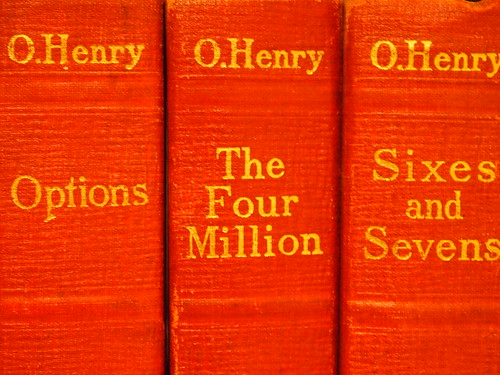Today marks the 150th anniversary of the birth of American writer O. Henry. Known for his twist endings, the North Carolina native also coined and popularized many words. We’ve gathered ten of our favorites here, with quotations from the O. Henry stories the words first appeared in.
banana republic
“In the constitution of this small, maritime banana republic was a forgotten section that provided for the maintenance of a navy.”
Cabbages and Kings, 1904
The term banana republic – now perhaps more popularly known as a clothing store – refers to “a small country that is economically dependent on a single export commodity, such as bananas, and is typically governed by a dictator or the armed forces.” The term was coined by O. Henry as “a pejorative political descriptor” in Cabbages and Kings, stories “derived from his 1896–97 residence in Honduras, where he was hiding from U.S. law for bank embezzlement.”
cut the mustard
“So I looked around and found a proposition that exactly cut the mustard.”
“Heart of the West,” 1907
To cut the mustard means “to suffice; to be good or effective enough.” The phrase, according to World Wide Words, is likely “a development of the long-established use of mustard as a superlative, as in phrases such as keen as mustard.” Furthermore, in 19th century America, “mustard was used figuratively to mean something that added zest to a situation, and the proper mustard was something that was the genuine article.”
El
“Behold Ikey as he ambles up the street beneath the roaring ‘El’ between the rows of reeking sweat-shops.”
“The Social Triangle,” The Trimmed Lamp, 1906
El is short for an elevated railway or train. “The Social Triangle” takes place in New York City, and refers to an elevated railway run by the Manhattan Railway.
get-rich-quick
“A get-rich-quick – excuse me – gang giving back the boodle!”
Get-rich-quick schemes claim “to provide large profits quickly, with no realistic chance of success, in order to lure gullible investment victims.” In the above quote, the speaker, a newspaper man, is referring to unbelievable stories such as “a sea serpent wriggling up Broadway,” or a get-rich-quick gang giving back boodle, or money.
marcelled
“‘They wash the gold out of the mountain streams,’ says the brown man, ‘and fill quills with it; and then they empty ’em into red jars till they are full; and then they pack it in buckskin sacks of one arroba each—an arroba is twenty-five pounds—and store it in a stone house, with an engraving of a idol with marcelled hair, playing a flute, over the door.’”
“Supply and Demand,” Options, 1909
Marcelled means having the appearance of a marcel hairstyle, “characterized by deep regular waves made by a heated curling iron,” named for French hairdresser, Marcel Grateau.
megaphonist
“‘What’s eatin’ you?’ demanded the megaphonist, abandoning his professional discourse for pure English.”
“Sisters of the Golden Circle,” The Four Million, 1906
A megaphonist is “someone who uses a megaphone,” which is “a large speaking-trumpet of a conical form.”
motoring
“And there are passably good roads through the woods where we go motoring.”
“Rus in Urbe,” Options, 1909
Motoring is “the art of driving or riding in an automobile or motor-car; the sport of driving motor-cars.” By the early 20th century, mass production of automobiles had begun, thus aiding in the popularity of driving for pleasure. Motoring is also the lyric of a certain song.
short order
“There amid the steam of vegetables and the vapours of acres of ‘ham and,’ the crash of crockery, the clatter of steel, the screaming of ‘short orders,’ the cries of the hungering and all the horrid tumult of feeding man, surrounded by swarms of the buzzing winged beasts bequeathed us by Pharaoh, Milly steered her magnificent way like some great liner cleaving among the canoes of howling savages.”
“An Adjustment of Nature,” The Four Million, 1906
A short order is “an order of food that can be prepared and served quickly,” and was first attested as a noun in the above O. Henry story. The phrase in short order means “without delay” and originated around 1834.
side-kicker
“Billy was my side-kicker in New York.”
Cabbages and Kings, 1904
Side-kicker, a partner, was popularized by O. Henry around 1903, says World Wide Words, although the word is older than that, and comes from an even older term, side-partner. Side-kicker became sidekick in 1906.
spiflicated
“Bill is all to the psychopathic about her; and me? – well, you saw me plating the roadbed of the Great Maroon Way with silver to-night. That was on account of Laura. I was spiflicated, Your Highness, and I wot not of what I wouldst.”
“The Story of the Young Man and the Harness Maker’s Riddle,” 1906
Spiflicated, “drunk,” comes from spiflicate, “confound, overcome completely,” says the Online Etymology Dictionary. Spiflicate is a 1749 cant word.
[Photo: CC BY 2.0 by Fried Dough]
